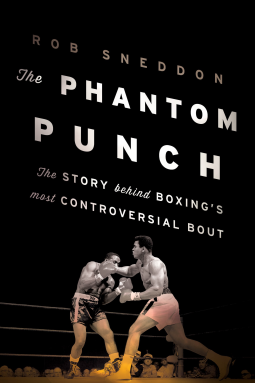
The Phantom Punch
The Story Behind Boxing's Most Controversial Bout
by Rob Sneddon
This title was previously available on NetGalley and is now archived.
Send NetGalley books directly to your Kindle or Kindle app
1
To read on a Kindle or Kindle app, please add kindle@netgalley.com as an approved email address to receive files in your Amazon account. Click here for step-by-step instructions.
2
Also find your Kindle email address within your Amazon account, and enter it here.
Pub Date Oct 04 2015 | Archive Date Oct 16 2015
Rowman & Littlefield | Down East Books
Description
Journalist and sports historian Rob Sneddon takes a fresh look at the infamous Muhammad Ali–Sonny Liston fight of May 25, 1965, which ended in chaos at a high school hockey rink in Lewiston, Maine. Sneddon digs deep into the fight’s background and comes up with fascinating new takes on boxing promotion in the 1960s; on Ali’s rapid rise and Liston’s sudden fall; on how the bout ended up in Lewiston —and, of course, on Ali’s phantom punch. That single lightning-quick blow triggered a complex chain reaction of events that few people understood, either then or now.
Even if you’ve seen films of the fight and think you know what happened, this book will change your perspective on boxing’s greatest controversy.
A Note From the Publisher
Available Editions
| EDITION | Other Format |
| ISBN | 9781608933655 |
| PRICE | $24.95 (USD) |
Links
Average rating from 10 members
Featured Reviews
 Budd B, Media/Journalist
Budd B, Media/Journalist
The most unlikely place for a heavyweight boxing championship match is no doubt Shelby, Montana. Jack Dempsey took on Tommy Gibbons in 1923 in a town that was essentially a collection of railroad crossings in Big Sky Country. A stadium was constructed for the bout, the fight was held (Dempsey won), the stadium came down, and a few people left with some money. The site is now partially occupied by a Burger King. I've been there; it (the location of the fight, not the Burger King) was odd then and it was odd now.
The second-most unlikely place for a heavyweight boxing championship match just might be Lewiston, Maine. Muhammad Ali knocked out Sonny Liston to retain the title in an unlikely finish.
"The Phantom Punch" is the story of that unique event, when an odd set of circumstances put one of the jewels of the sporting calendar in a small town in Maine.
And after reading the book, you might come to the same conclusion that I did. This is a movie, waiting to be written and filmed.
The story is irresistible. Cassius Clay had just knocked out Sonny Liston in 1964, and prompted changed his name to Muhammad Ali to reflect his religious viewpoints. America at that point knew it was scared of Liston, a man not unfamiliar with the nation's law enforcement system. He was something of "The Boogie Man" to many. But some Americans preferred that image to the one portrayed by Ali at the time, as he had joined the Black Muslims. As a result, no one was too anxious to try to host the rematch. When Ali had an operation for a hernia just before that second bout between the men, it gave forces in Boston time to come up with enough power to ban it from that Massachusetts city.
The date for the rematch was set, but where should be held? Maine promoter Sam Michael stepped up and offered an arena in Lewiston. Since the backers were more interested in pay-per-view sales than attendance at the bout itself, the offer was accepted.
It's tough to imagine what Lewiston must have been like in the days around the fight. It was a small, almost all white, working-class town that had seen tough times. Suddenly, two of the most famous black men in the world turn up for the fight. The dynamics are fascinating, and the book is at its best when describing what went on. For example, Liston - who had a weak spot for kids - spent a morning at an elementary school on a night's notice. He didn't just visit someone's son (who had asked for the visit), but made the rounds of every room in the school. According to all, Liston couldn't have been nicer, and is still well-regarded in Lewiston for his behavior.
Then there's the fight itself, which instantly became legendary. With rumors of fixes and murder attempts everywhere, Liston was knocked down by a punch that a lot of people at ringside didn't even see - hence the title of the book. The referee botched the count badly, and the fight resumed ... only to be stopped and declared over.
The movie could almost write itself - media members and celebrities arrive in Lewiston, Ali driving a bus down the main streets of the city, residents grabbing a case of soft drinks in order to pose as a delivery person and sneak into the arena.
"The Phantom Punch" probably lingers a bit much on the story of the promoter and the business deals involved in the fight. It's a little difficult to make that interesting. But author Rob Sneddon knows the boxing business, and makes a good case that Liston at that point in his life was no match for Ali under any circumstances. It's the background story, though, that supplies some charm.
It makes for a worthwhile, if a bit short, book. Let's hope Sneddon can sell the movie rights.
The second heavyweight title fight between Muhammad Ali and Sonny Liston ended with one of the strangest and controversial endings in boxing history. Considering the history of the sport and its seamy underbelly, this is quite a statement. However, this outstanding book by Robert Sneddon makes the case for this statement and tells of the background of all aspects of this fight held in a small town in central Maine.
The book read much like a bout between two champion boxers that may start with a flourish, and then slow down as the two opponents feel each other out. In a boxing match that will often lead to more punches landing, more flurries by both fighters and eventually reach an exciting finish. This book did the same thing as it started with how many people view the ending of that fight today. Then there came a lot of background information on not only Ali and Liston but also about the town of Lewiston, Maine and the politics and officials that either helped bring the fight there or wanted to keep it away.
This portion of the book doesn’t sound like it would be exciting or of much interest to readers who are interested in the actual fight. However, that is not the case as much of this information is well researched and written in such a manner that a reader will be both well-informed and well-entertained while reading it. Sam Michael and the Nilon brothers are just a few of the people who may not be household names to boxing fans or historians but they played important roles in this fight.
The sections on boxing, especially for both Ali-Liston fights, were excellent reads as well. I was especially impressed with Sneddon’s account of the first fight between them in Miami, as that information was especially important when it came time to talk about the rematch. As for the punch that is the center of the controversy even to this day, Sneddon does report on it fairly, writing about views from both sides. He is careful to emphasize that there were many who felt the punch did land on Liston as well as report on those that believed it never connected. Because of this, I felt that this book was not one that tried to sway readers one way or the other, especially those that already have their minds made up. Instead, it seemed that the target audience would be for readers like me who have never seen the punch or the films of it and instead wanted to learn about this controversy. For this goal, the book hits its mark and is an excellent account of a heavyweight championship fight that will be talked about as long as boxing remains a sport.
I wish to thank Down East Books for providing an advance review copy of the book via NetGalley in exchange for an honest review.
The State of Maine is viewed by many as the hinterlands, a far-off outpost on the edge of civilization. Its relative isolation and low population makes it one of the last places you’d think of for, say, a major sporting event.
However, just over 50 years ago, Maine – specifically Lewiston – played host to what would become one of the most controversial events in the history of American sport.
“The Phantom Punch: The Story Behind Boxing’s Most Controversial Bout” tells the story of the 1965 heavyweight title bout between Sonny Liston and Muhammad Ali – a bout that, due to a long list of unlikely circumstances, wound up being contested right here in Maine. Sports historian Rob Sneddon’s book addresses not only the fight itself, but Maine’s long boxing history and the sequence of events that led to Lewiston playing host to the title bout.
Any fight fan has some basic knowledge of Ali-Liston II, though even decades later, opinions on the matter remain sharply divided. Some are sure that Ali won fair and square, others are just as sure that Liston took a dive (for the record, Sneddon is solidly in the “fair and square” camp).
It all began in Miami Beach in 1964, when a young upstart then known as Cassius Clay defeated reigning heavyweight champion Sonny Liston when Liston refused to answer the bell in the seventh round due to injury. What followed was a maelstrom of innuendo and unfounded allegations about Liston possibly taking a dive at the behest of some of his more unsavory associates. Said maelstrom was then compounded by Clay’s pledge of allegiance to the Nation of Islam and changing his name to Muhammad Ali.
What followed was a game of hot potato, with numerous cities being involved as potential destinations for a rematch. However, Liston was viewed as a criminal and Ali was considered a malcontent, resulting in every major city and promoter passing on the fight.
That’s where Sam Michael came in.
Michael was a longtime presence in Maine’s then-thriving boxing community. He was a tireless promoter with plenty of connections all over the boxing realm; he spent years in the game before moving on into the private sector, taking a job in the Lewiston city government. But he never lost that love of the sport, and when promoter after promoter kept dropping the bout, Michael stepped up and – through lots of talk, lots of travel and lots of luck – convinced the boxing world to give his little city a title shot of its own.
What he didn’t know – what he couldn’t have known – was that the fight he worked so hard to procure would last less than a single round and feature one of the most controversial endings in the history of the heavyweight championship. Liston was felled by a punch that few people were able to see, prompting even more talk of his mob ties and raising questions about the legitimacy of Ali’s title.
Volumes have been written about this era in boxing in general and this fight in particular. What Sneddon has done, however, is find a way to provide context to the iconic moment. Far more than the fight itself, he throws us into the complex and shadowy world of fight promotion. We get a textured exploration of the many players – major and minor alike – who helped make this moment happen. He also provides a nuanced Maine perspective; even fight fans with local connections might not be aware of the state’s rich history with the sport. The years are peeled back and we get a snapshot of an era – the early 1960s – when not just the sport of boxing, but American culture as a whole was in turmoil. And of course, we get an in-depth look at the time leading up to the bout, as well as the all-too-brief fight itself.
Fully capturing a moment in time, “The Phantom Punch” is a meticulously researched and compellingly written account of one of the most significant moments in boxing history (not to mention Maine sports history) – one that, while long past, will likely never be forgotten.
 Jay E, Media/Journalist
Jay E, Media/Journalist
Any serious sports fan knows the story of the rise of Muhammed Ali and his bouts against Sonny Liston. But Robert Sneddon brings the reader into the long-forgotten world of the mid-'60s, when boxing's credibility, despite its popularity, was so low the heavyweight championship had to be decided in a small gym in Lewiston, Maine. Today, Ali is revered worldwide as perhaps the greatest living athlete. Then, he was disrespected from all sides -- a brash and impolite upstart who seemed to violate all the unwritten rules of decorum. All this was set against a world that was changing, and an unpopular war in Vietnam. Sneddon brings all this together to tell a familiar story in a way never before seen. The phantom punch made that fight legendary, but it was a more than a punch. It was a symbol of the times and the changes underway in American society.
 Pat L, Reviewer
Pat L, Reviewer
The author takes you back in time when boxing was the true sport of champions. He takes you through the process of the man who was able to bring the fight to Maine of all places. This being the second fight between Liston and Ali. How the fight came to take place in the Lewistown Maine in a High school gym, hockey rink. Even how the town was able to accommodate all of the people for the fight, T.V. and other press, radio, and just the average person that wanted to be there. The difficulties with security and so much more that was not even part of their thought process at the time. You also get a look back at the first fight. A look into both of their career’s to this point, and what both had been doing until the agreement of the fight. Then a round by round description of the fight up to the controversial end where even that has people saying two different things. For me I found this to be an excellent book about a famous sporting event that shows you all of the different sides and the outcome for everyone involved. From the fighters, to the man who worked to bring the fight to the town to the town itself. A very good book about a totally different time.
Readers who liked this book also liked:
Silvia Moreno-Garcia
Historical Fiction, Literary Fiction, Sci Fi & Fantasy
Stefano Bizzotto
Entertainment & Pop Culture, History, Sports











